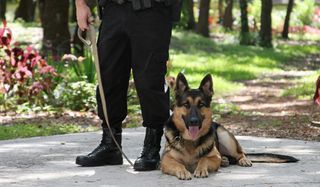
Protect and Serve — Including the Animals (Op-Ed)

Wayne Pacelle is the president and chief executive officer of The Humane Society of the United States (HSUS). This Op-Ed is adapted from a post on the blog A Humane Nation, where the content ran before appearing in Live Science's Expert Voices: Op-Ed & Insights.
In recent years, legislatures have been fortifying the legal framework against animal cruelty, step-by-step, with felony-level penalties adopted for dog fighting, cockfighting and other extreme acts of violence. In addition, every day there are more and more interventions against cruelty in dozens of communities nationwide, as police and sheriffs and animal control personnel raid and bust up animal fighting rings, puppy mill operations and other dens of abuse.
The changes in the law, and the more serious-minded enforcement of those laws, marks a sea change in Americans' attitudes toward animals and our recognition of human responsibility to them. Increasingly, we're seeing concern for animals institutionalized within a broader range of entities and organizations and agencies responsible for upholding and strengthening our laws and their enforcement.
One of the entities helping to lead the charge against cruelty is the National Sheriffs' Association, which recently partnered with The HSUS, the International Association of Chiefs of Police, the Fraternal Order of Police and hundreds of local law enforcement agencies in convincing the U.S. Congress to make it a federal crime to attend or bring a child to an animal-fighting spectacle. President Obama signed that legislation, as part of the massive 2014 Farm Bill, on Feb. 7 — the fourth major upgrade of the federal animal-fighting law since 2002.
Just weeks ago, the National Sheriffs' Association — founded in 1940 and representing thousands of sheriffs, deputies, and other law enforcement — helped create the National Coalition on Violence Against Animals (NCVAA). This new group pulls together leading sheriffs and police, prosecutors, judges, mental-health specialists , domestic-violence professionals and animal-protection advocates to develop and promote policies, strategies, guidelines and programs that will reduce violence against animals and its harmful effects on children, families and society.
The association has also submitted a proposal to the FBI to add animal cruelty as a separate category to the Uniform Crime Reporting Program. The collection and analysis of animal cruelty offenses by the FBI will encourage law enforcement to pursue animal cruelty crimes and also provide an important tool to better target police activity and interventions.

It's now widely recognized that cruelty begets more of it, with the victims one day being animals and on other days children and other vulnerable parties. A 2001 to 2004 study by the Chicago Police Department "revealed a startling propensity for offenders charged with crimes against animals to commit other violent offenses toward human victims." Of those arrested for animal crimes, 65 percent had been arrested for battery against another person.
Sign up for the Live Science daily newsletter now
Get the world’s most fascinating discoveries delivered straight to your inbox.
If we as Americans want to protect our communities, we have to prevent cruelty to animals, and when it occurs, crack down on it and arrest or treat those who perpetrate it. Cruelty is corrosive. It must be eradicated if we are to have a civil society.
The National Sheriffs' Association and so many other professional law enforcement organizations are partners in The HSUS campaign to root out cruelty in all of its forms. They are helping set the tone in our relationship with animals and the ongoing campaign to protect them. That's a remarkable development for animals and the whole of society.
Pacelle's most recent Op-Ed was "Sochi Mass Killing Street Dogs in Olympics 'Cleansing'." This article was adapted from "Protect and Serve — Including the Animals," which first appeared on the HSUS blog A Humane Nation. The views expressed are those of the author and do not necessarily reflect the views of the publisher. This version of the article was originally published on Live Science.
